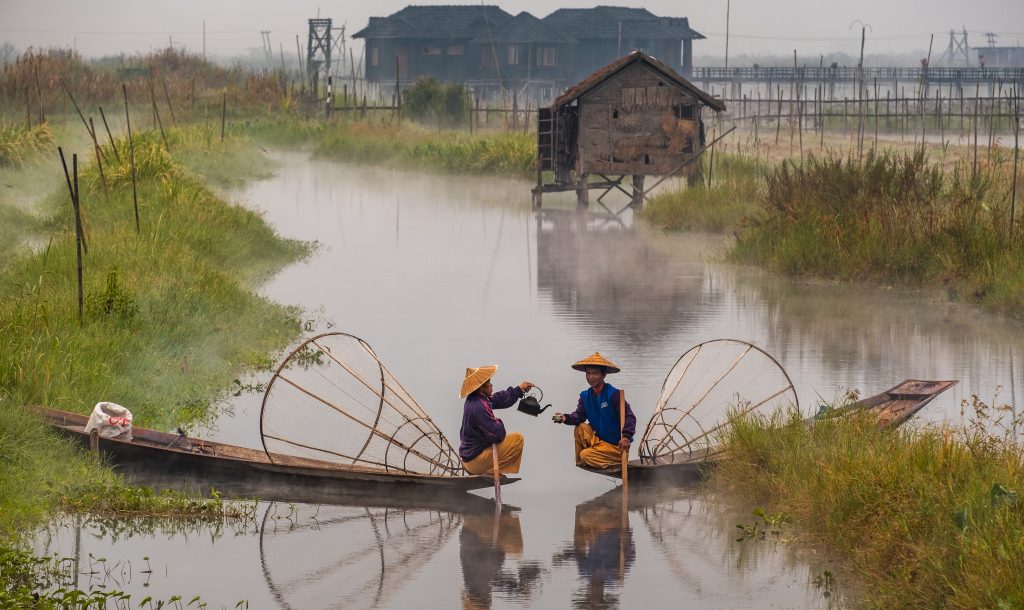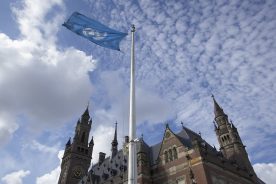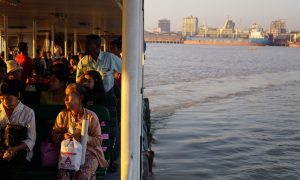မြန်မာဘာသာဖြင့် ဖတ်ရှုရန်အတွက် ဤနေရာတွင် နှိပ်ပါ။
Klik di sini untuk membaca tulisan dalam Bahasa Indonesia
Political actors in Myanmar are in a struggle over constitutional reform, which is a form of political capital. All the key political actors want to control the prospects for constitutional reform and benefit from the political capital this opportunity offers.
Among these actors are the military, as the most powerful and unaccountable political actor. It also includes the Union Solidarity and Development Party (USDP) which is the proxy political party for the military. Ethnic political parties also play a role as a small but diverse group connected to the multiple ethnic armed organisations scattered across the country. Finally, of course, the National League for Democracy (NLD), Aung San Suu Kyi’s political party. Each of these political actors want to claim that they pushed forward constitutional reforms in the hopes it will boost their popularity ahead of the 2020 elections.
Competition over Constitutional Reform
The NLD was the first to challenge in January this year, putting forward a legislative motion to form a committee to consider constitutional amendments. This move was controversial because the NLD submitted this motion on the second anniversary of the assassination of the country’s most prominent constitutional lawyer, Ko Ni.
The military strongly opposed the NLD’s move, with the military delegates in the legislature refusing to vote on the legislative motion to form a committee for constitutional reform. They argued it was procedurally invalid, although they clearly do not want the NLD to lead discussions over constitutional reform.
In addition to opposition in the legislature, there has been opposition on the streets. Rallies have been staged in Yangon and other parts of the country in support of the military’s position to retain the essence of the Constitution.
For example, in early February, I was in Yangon, heading downtown one Sunday afternoon when my taxi passed a group of pro-military protestors preparing for a demonstration. The protestors were given two flags. One was the national flag that is a symbol of nationalism, but also of the 2008 Constitution and the power of the constitution-makers, the military. The flag appeals to a sense of nationalist-military pride.
The second flag had a white dove on a blue background, which evokes the peace process that has been ongoing since 2012. This is an exclusive peace process for recognised ethnic armed groups. Running separate and parallel to this process are other conflicts. The violence in Rakhine State and the mass displacement of the Rohingya is said by the government and military to be an issue of terrorism, and so is addressed outside of the peace process.
The symbolic power of flags is used to support the claim that the Constitution should not be changed.
Proposals for Change: What’s New is Old
The Union Solidarity and Development Party (USDP) has used this opportunity for constitutional reform in the legislature to push its agenda. The USDP first focused on article 261, the provision of the Constitution regulating the appointment of Chief Ministers of the States and Regions. In Myanmar, there are fourteen states and regions. Yet the sub-national governments’ powers are limited and they remain closely affiliated with the Union government.
This is because the President holds the power to appoint Chief Ministers, which reduces both the real and perceived independence of State and Region governments. This power ensures appointees are closely connected to the central Union government. The USDP has proposed to amend the Constitution to allow the legislature at the State and Region level to appoint the Chief Minister. This proposal is not new but is generally understood in Myanmar as a measure towards decentralisation.
Will Canada take Myanmar to the ICJ for genocide?
Exploring possible paths to justice for crimes against the Rohingya.
The USDP wanted its proposal to be considered as a separate bill in an attempt to gain credit for this potential constitutional reform. The USDP seeks constitutional reform as a form of political capital in the lead up to the 2020 elections. The NLD has resisted the USDP’s claims and instead included discussion of the proposal as part of the broader review undertaken by the legislative committee formed by the NLD. This dispute represents a struggle over who gets to own and claim credit for constitutional reform.
The USDP and military have put forward other key changes. Among these changes include measures at decentralisation. For example, the President has complete power to determine the number of ministries at the State/Region level. The USDP has proposed constitutional amendment so that the president must consult with the State/Region legislature on this decision (revising article 248(c)). This would be a small step towards decentralisation and may allow variations in governance among the states.
Most recently, the military has proposed that a new constitutional provision be inserted in an attempt to prevent Suu Kyi from becoming a minister in the next government. The military argues that a person who has foreign citizenship or whose immediate family has foreign citizenship should be constitutionally prohibited from becoming a Union Minister. The same provision already exists in relation to the President, which is why Suu Kyi cannot become the president.
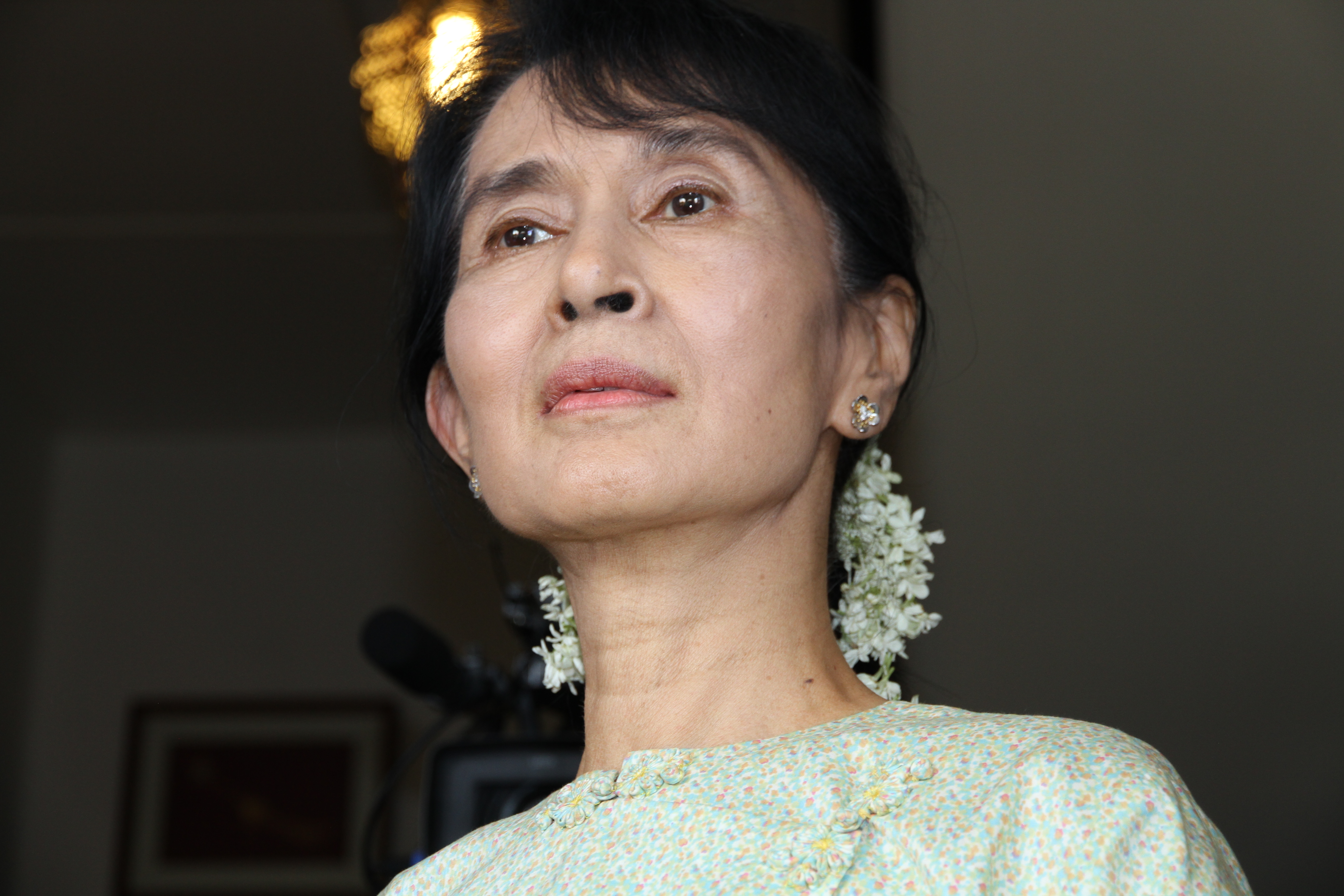
Image Credit Kjetil Elsebutangen
Other minor political parties, such as the Arakan National Party (ANP) have called for amendments to ensure the legislature only contains civilian representatives. This is a blunt challenge to the military and a consequence of the escalation of the conflict between the Arakan Army and the military.
The NLD has taken a middle path, suggesting a gradual reduction in the number of military representatives in the legislature over time. There are deep divisions over whether the military should remain in the legislature, and if so for how long. On its side, the military remains committed to its privileges under the 2008 Constitution, such as its seats in parliament.
In July, the Committee for constitutional reform completed its review. Much of the debate – in process and substance – is similar to the legislative debate in 2015. While new claims for constitutional reform continue to be made, much of this is related to old debates about aspirations for civilian rule, federalism and democracy in Myanmar.
Support for Aung San Suu Kyi
The constitutional reform process has not received significant international attention because of the more pressing humanitarian crisis. The situation for the Rohingya, both for those who remain in Rakhine State and those who fled to Bangladesh, remains dire. The situation badly taints the present government, if only at the international, rather than domestic, level.
On 19 September 2017, Aung San Suu Kyi addressed the United Nations and gave her opinion as the State Counsellor of Myanmar regarding the grave conflict and displacement crisis in Rakhine State. Her speech was widely criticised by the international community for failing to acknowledge the reality and enormity of the humanitarian and displacement crisis that had been unfolding since 25 August.
Yet Suu Kyi has benefited from the Rakhine State crisis domestically. On the same day as Suu Kyi’s speech to the UN, protests were held by pro-Suu Kyi supporters across major towns in Myanmar. In addition, the diaspora organised demonstrations at sites around the world, such as at the Australian parliament house in Canberra. These demonstrations were organised under the slogan of ‘We Stand with Daw Suu’.
The message was clear: many people in Myanmar support Aung San Suu Kyi and her position of denial on the crisis in Rakhine State. This demonstrates support for an illiberal view that sanctions the exclusion of the Rohingya from the political community of Myanmar.
The international community has been confounded by the strong, united response from within Myanmar that largely denies the state of suffering of the Rohingya who are displaced both within Myanmar and across the border in Bangladesh. The National League for Democracy government and the military have at various times denied the scale, scope and legitimacy of the suffering and the urgency or necessity of taking responsibility. While the NLD is not without agency in this situation, the military still has the upper hand in the struggle for political power.
The debate over constitutional reform is often presumed to be one about minority rights. Yet the illiberal nature of the debate means that the issue of the Rohingya does not feature in the discussions. This is despite the issues of citizenship, recognition of land, culture and basic rights being at the heart of the Rohingya crisis.
Civilian v Military Power Plays: The Power to Pardon
The constitutional reform debate is an arena where civilian actors are in a struggle against military power. Another way that the struggle between civilian and military authorities is on display is the power to pardon perpetrators of the violence in Rakhine State.
Two journalists, Wa Lone and Kyaw Soe Oo, spent more than 16 months behind bars on charges of obtaining state secrets. This case related to their investigation into a massacre in one village in Rakhine State and hit global news because they were reporting for Reuters.
The journalists were sentenced to jail, much to the condemnation of the international community, but then pardoned by the president. On 7 May, the two journalists were finally released on the decision of the President.
The President has the power to pardon or to grant an amnesty based on the recommendation of the National Defence and Security Council. The Council consists of eleven members including the Commander-in-Chief, with a majority of members from the military. The president has traditionally pardoned prisoners over Myanmar’s New Year.
Yet in a turn of events, some of the perpetrators of the Inn Din massacre were also pardoned in what appears to have been a secret process oversee by the military. Several military officers responsible for the Inn Din massacre were initially sentenced to ten years jail by the Courts Martials. The Courts Martial are under the control of the Commander-in-Chief. The decision was announced in March 2018, but by November that same year the soldiers were allegedly pardoned in secret. The pardon was only publicly discovered six months later in May 2019. A civilian who was also convicted for his complicity in the murder of the ten Rohingya villagers remains in jail.
The decision to pardon the soldiers could be unconstitutional. The military claims it has the power to pardon the accused tried in the Courts Martial. Yet the Constitution does not specifically grant the Commander-in-Chief the power to pardon or grant amnesty to someone convicted by a Courts Martial. The secret pardon by the military is a display of its power and independence.
There has been international backlash against the military for its decision to release the soldiers. In July 2019, the United States imposed sanctions on the Commander in Chief. The US noted that this was in response to allegations that the Commander-in-Chief and other senior military figures were linked to extrajudicial killings of the Rohingya in Rakhine State.
Illiberal Visions of Reform
Suu Kyi and the NLD have won support domestically for their stance in Rakhine State, but at the same time have lost the support from the international community. They still face domestic opposition from pro-military groups, as evidenced by anti-constitutional change protests.
The Rakhine State crisis has been isolated from both the peace process and debates about constitutional reform.
The Constitution helps to sustain illusions about civilian power and democracy in Myanmar. The example of the power to pardon shows how the presidents’ constitutional power is undermined by the power of the military to quietly pardon soldiers convicted for horrific crimes in Rakhine State. This is one example of how the military wins in power plays against civilian authorities.
All political actors know the people want some kind of constitutional change. All want to take credit for achieving such change. As such, constitutional reform is a kind of political capital in Myanmar. Yet the struggle for political capital through constitutional reform is not between liberal and illiberal visions of democracy, but rather between varying visions of illiberal rule, as the debate on constitutional reform shows.
What all sides of politics share in common is a commitment to an illiberal politics that excludes the Rohingya.
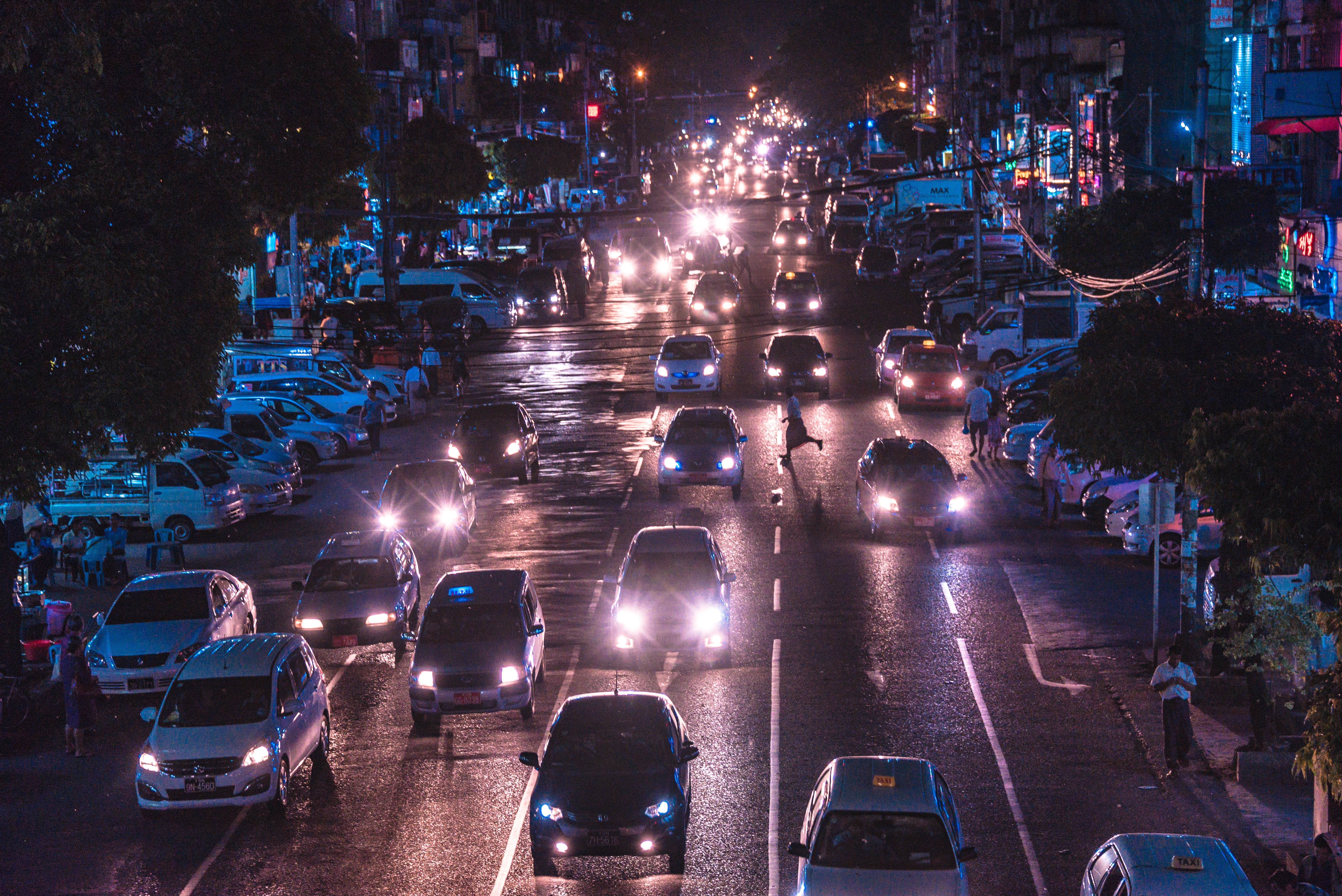
Image Credit Zuyet Awarmatik
မြန်မာ့နိုင်ငံရေးအင်းအားစုများသည် ၎င်းတို့၏နိုင်ငံရေးစွမ်းဆောင်မှုတစ်ရပ်အဖြစ်ဖော်ပြနိုင်ရန်အတွက် ၂၀၀၈ ဖွဲ့စည်းပုံအခြေခံဥပဒေအား ပြင်ဆင်ရန် ရုန်းကန်အားထုတ်နေကြသည်။ အဓိကကျသော နိုင်ငံရေးအင်အားစုများ အားလုံးလိုလိုသည် ဖွဲ့စည်းပုံအခြေခံဥပဒေပြင်ဆင်ရေးလုပ်ငန်းကို ထိန်းချုပ်လိုကြပြီး အဆိုပါစွမ်းဆောင်မှုမှ ရရှိလာမည့် နိုင်ငံရေးအကျိုးအမြတ်များကို ရယူခံစားလိုကြသည်။
အဆိုပါနိုင်ငံရေးအင်အားစုမျာတွင် ဒေါ်အောင်ဆန်းစုကြည်၏ အမျိုးသားဒီမိုကရေစီအဖွဲ့ချုပ် (NLD)၊
အင်အားအကြီးမားဆုံးနှင့် တာဝန်ခံမှုအကင်းမဲ့ဆုံ နိုင်ငံရေးအင်းအားစုဖြစ်သည့် မြန်မာ့တပ်မတော်၊ တပ်မတော်၏ ကျောထောက်နောက်ခံနိုင်ငံရေးပါတီဖြစ်သော ပြည်ထောင်စု ကြံ့ခိုင်ရေးနှင့် ဖွံ့ဖြိုးရေးပါတီ (USDP) တို့ပါ၀င်သည့်အပြင် နိုင်ငံတဝန်းတွင်ပြန့်ကျဲလျက်ရှိသည့် တိုင်းရင်းသား လက်နက်ကိုင် အဖွဲ့အစည်းများနှင့် အချိတ်အဆက်ရှိသော တိုင်းရင်းသားနိုင်ငံရေးပါတီများလည်း အခန်းကဏ္ဍအနည်းငယ် မှ ပါဝင်ကြပါသည်။ အဆိုပါ နိုင်ငံရေးအင်အားစု အသီးသီးတို့သည် လာမည့် ၂၀၂၀ ရွေးကောက်ပွဲအတွက် ၎င်းတို့၏ ပုံရိပ်များကိုမြှင့်တင်နိုင်ရန်မျှော်လင့်ချက်ဖြင့် ၎င်းတို့မှ ဖွဲ့စည်းပုံအခြေခံဥပဒေပြင်ဆင်နိုင်ရေး အတွက် တိုက်တွန်းလုပ်ဆောင်နေကြောင်းကို ဖော်ပြလိုကြသည်။
ဖွဲ့စည်းပုံအခြေခံဥပဒေပြင်ဆင်ရေး အားပြိုင်မှု
NLD ပါတီသည် ယခုနှစ် ဇန်နဝါရီလတွင် ဖွဲ့စည်းပုံအခြေခံဥပဒေပြင်ဆင်ရေး ကော်မတီ ဖွဲ့စည်းနိုင်ရန် လွှတ်တော်တွင်အဆိုတစ်ရပ်တင်သွင်းခြင်းဖြင့် ဖွဲ့စည်းပုံအခြေခံဥပဒေပြင်ဆင်ရေး အားပြိုင်မှုကို စတင်လိုက်သည်။ ၎င်းအဆိုတင်သွင်းသောနေ့သည် NLD ၏ အထင်ကရ ဖွဲ့စည်းပုံအခြေခံဥပဒေဆိုင်ရာ ပညာရှင်တစ်ဦး ဖြစ်သည့် ဦးကိုနီလုပ်ကြံသတ်ဖြတ်ခံရသော ဒုတိယနှစ်ပတ်လည်နေ့ဖြစ်သောကြောင့် အဆိုပါလုပ်ဆောင်ချက်သည် အငြင်းပွားဖွယ်ဖြစ်ခဲ့သည်။
NLD ၏ လုပ်ဆောင်ချက်အား တပ်မတော်က အပြင်းအထန် ကန့်ကွက်ခဲ့ရာ တပ်မတော်သား လွှတ်တော်ကိုယ်စားလှယ်များမှ အဆိုပါကော်မတီဖွဲ့စည်းရေးအဆိုအား ဆန္ဒမဲပေးရန်ငြင်းဆန်ခဲ့သည်။ ၎င်းတို့က ထိုအဆိုသည် လုပ်ထုံးလုပ်နည်းများနှင့်ကိုက်ညီမှုမရှိဟု ဝေဖန်ခဲ့သော်လည်း NLD မှ ဖွဲ့စည်းပုံအခြေခံဥပဒေပြင်ဆင်ရေးလုပ်ငန်းစဥ်များအား ဦးဆောင်မည်ကို တပ်မတော်က မလိုလား သည်မှာထင်ရှားပေါ်လွင်နေပါသည်။
NLD ၏ လုပ်ဆောင်ချက်အား လွှတ်တော်အတွင်းမှ ကန့်ကွက်ခြင်းသာမက ပြည်သူများကြားတွင်လည်း ကန့်ကွက်မှုများရှိခဲ့သည်။ ၂၀၀၈ ဖွဲ့စည်းပုံအခြေခံဥပဒေ၏အနှစ်သာရအား ထိန်းသိမ်းနိုင်ရေးအတွက် ကြိုးပမ်းနေသော တပ်မတော်၏ရပ်တည်ချက်ကို ထောက်ခံသည့် လမ်းလျှောက်ဆန္ဒပြကန့်ကွက်မှုများအား ရန်ကုန်နှင့် အခြားသောဒေသများတွင် ကျင်းပပြုလုပ်ခဲ့ကြသည်။
ဥပမာအနေဖြင့် စာရေးသူသည် ဖေဖော်ဝါရီလအစောပိုင်း တနင်္ဂနွေနေ့ တစ်နေ့၏ နေ့လည်အချိန်တွင် ရန်ကုန်မြို့လယ်သို့ အငှားယာဉ်ဖြင့်သွားရောက်စဉ် တပ်မတော်ကိုထောက်ခံသော အဖွဲ့တစ်ဖွဲ့မှ ဆန္ဒထုတ်ဖော်ရန်အတွက် ပြင်ဆင်နေသည်ကို တွေ့မြင်ခဲ့ရသည်။ ဆန္ဒထုတ်ဖော်သူများကြားတွင် အလံအမျိုးအစားနှစ်မျိုးကို တွေ့ရှိရသည်။ ပထမအလံမှာ အမျိုးသားရေးနှင့်တပ်မတော် ဒွန်တွဲနေသည်ကို ဂုဏ်ယူ ဖော်ကျူးထားသော လက်ရှိနိုင်ငံတော်အလံဖြစ်ပါသည်။ လက်ရှိနိုင်ငံတော်အလံသည် အမျိုးသားရေးကို ကိုယ်စားပြုသည့်အပြင် ၂၀၀၈ ဖွဲ့စည်းပုံအခြေခံ ဥပဒေနှင့် အဆိုပါအခြေခံဥပဒေကို ရေးဆွဲသော တပ်မတော်ကိုလည်း ကိုယ်စားပြုသည်။
ဒုတိယအလံမှာ ၂၀၁၂ ခုနှစ်မှ စတင်ခဲ့သော ငြိမ်းချမ်းရေးဖြစ်စဉ်အားကိုယ်စားပြုသည့် အဖြူရောင်ချိုးငှက်ပါ အပြာရောင်နောက်ခံအလံ ပင်ဖြစ်သည်။ အဆိုပါငြိမ်းချမ်းရေးဖြစ်စဉ်သည် အသိအမှတ်ပြုခံရထားသော တိုင်းရင်းသားလက်နက်ကိုင်အဖွဲ့အစည်းများနှင့်ပတ်သတ်သော တစ်ခုတည်းသော ငြိမ်းချမ်းရေးဖြစ်စဥ် ဟုဆိုရာ ၎င်းပြင်ပတွင် အခြားပဋိပက္ခ များစွာရှိနေပါသည်။ ရခိုင်ပြည်နယ်တွင် ဖြစ်ပွားလျက်ရှိသော အကြမ်းဖက်မှုများနှင့် အစုအပြုံလိုက် နေရပ်စွန့်ခွာထွက်ပြေးမှုများ အား အစိုးရနှင့်တပ်မတော်မှ အစွန်းရောက်အကြမ်းဖက်မှုအရေးကိစ္စအဖြစ် ရှုမြင်သောကြောင့် အဆိုပါငြိမ်းချမ်းရေးဖြစ်စဉ်၏ ဘောင်ပြင်ပ၌သာ ဖြေရှင်းနေပါသည်။
အဆိုပါအလံများအား ဖွဲ့စည်းပုံအခြေခံဥပဒေအားပြင်ဆင်မှု မပြုလုပ်သင့်ဟူသော အမြင်သဘောထားကို ထောက်ခံရာတွင် အသုံးပြုလေ့ရှိပါသည်။
ပြောင်းလဲမှုအတွက် အဆိုပြုချက်များ – အသစ်ဆိုသည်မှာ အဟောင်းသာလျှင်ဖြစ်သည်
ပြည်ထောင်စု ကြံ့ခိုင်ရေးနှင့်ဖွံ့ဖြိုးရေးပါတီသည်လည်း ၎င်း၏ရည်ရွယ်ချက်ကို အကောင်အထည်ဖော်နိုင်ရန် လွှတ်တော်တွင် ဖွဲ့စည်းပုံအခြေခံဥပဒေပြင်ဆင်ရေးအခွင့်အလမ်း ကိုအသုံးချခဲ့သည်။ ၎င်းပါတီသည် ပြည်နယ်နှင့် တိုင်းဒေသကြီး၀န်ကြီးချုပ်များ ခန့်အပ်ခြင်းဆိုင်ရာ ဖွဲ့စည်းပုံအခြေခံဥပဒေ ပြဋ္ဌာန်းချက်ဖြစ်သော ပုဒ်မ (၂၆၁) အား ပြင်ဆင် နိုင်ရန် ဦးတည်ခဲ့သည်။ မြန်မာနိုင်ငံတွင် ပြည်နယ်နှင့် တိုင်းဒေသကြီး (၁၄) ခု ရှိသော်လည်း ၎င်းတို့ကို ပြည်ထောင်စုအစိုးရနှင့် နီးကပ်စွာ ပေါင်းစည်းဖွဲ့စည်းထားသောကြောင့် လုပ်ပိုင်ခွင့်များ ကန့်သတ်ခံနေရပါသည်။
နိုင်ငံတော်သမ္မတတွင် ပြည်နယ်နှင့်တိုင်းဒေသကြီးဝန်ကြီးချုပ်များအား ခန့်အပ်နိုင်သောအခွင့်အာဏာ ရှိသောကြောင့် ပြည်နယ်နှင့်တိုင်းဒေသကြီးအစိုးရအဖွဲ့များသည် လွတ်လပ်မှုနည်းပါးလှသည်။ အဆိုပါ သမ္မတ၏အခွင့်အာဏာကြောင့် ပြည်နယ်နှင့်တိုင်းဒေသကြီးဝန်ကြီးချုပ်များအဖြစ် ခန့်အပ်ခံရသူများသည် ပြည်ထောင်စုအစိုးရနှင့် နီးစပ်သူများသာဖြစ်နေသည်။ ပြည်ထောင်စု ကြံ့ခိုင်ရေးနှင့်ဖွံ့ဖြိုးရေးပါတီက ပြည်နယ်နှင့်တိုင်းဒေသကြီးဝန်ကြီးချုပ်များအား သက်ဆိုင်ရာပြည်နယ်နှင့် တိုင်းဒေသကြီးလွှတ်တော်များမှ ခန့်အပ်စေရန်အဆိုပြုခဲ့သည်။ အဆိုပါအဆိုပြုချက်မှာ အသစ်အဆန်းမဟုတ်သော်လည်း ဗဟိုချုပ်ကိုင်မှု လျှော့ချရေးသို့ဦးတည်သော လုပ်ဆောင်မှုတစ်ရပ်ဖြစ်လာနိုင်ကြောင်း မြန်မာနိုင်ငံတွင် ကျယ်ကျယ်ပြန့်ပြန့် နားလည်ထားကြသည်။
ပြည်ထောင်စု ကြံ့ခိုင်ရေးနှင့်ဖွံ့ဖြိုးရေးပါတီ၏အမြင်တွင် ၂၀၀၈ ဖွဲ့စည်းပုံအခြေခံဥပဒေပြင်ဆင်ခြင်းသည် ၂၀၂၀ ရွေးကောက်ပွဲအတွက် ပြင်ဆင်ရာတွင် အသုံး၀င်နိုင်မည့် နိုင်ငံရေးစွမ်းဆောင်ချက်တစ်ရပ်ပင်ဖြစ်သည်။ ၂၀၀၈ ဖွဲ့စည်းပုံအခြေခံဥပဒေပြင်ဆင်ရေး အကောင်အထည်၊ ရလာဒ်များပေါ်ပေါက်လာပါက ၎င်း၏ ကြိုးပမ်းမှုများကို အသိအမှတ်ပြုစေလိုရာ ပြည်ထောင်စု ကြံ့ခိုင်ရေးနှင့်ဖွံ့ဖြိုးရေးပါတီက ၎င်း၏ အဆိုပြုချက်အား သီးသန့်ဥပဒေကြမ်းတစ်ရပ်အဖြစ်တင်သွင်းနိုင်ရန် တောင်ဆိုခဲ့သည်။ NLD က ၎င်းတောင်းဆိုချက်ကို ငြင်းပယ်ခဲ့ပြီး ပြည်ထောင်စု ကြံ့ခိုင်ရေးနှင့်ဖွံ့ဖြိုးရေးပါတီ၏ အဆိုပြုချက်အား NLD ကဖွဲ့စည်းထားသော ဖွဲ့စည်းပုံအခြေခံဥပဒေပြင်ဆင်ရေး ကော်မတီ၏ ညှိနှိုင်းဆွေးနွေးမှုအောက်သို့ သာထည့်သွင်းခဲ့သည်။ ထိုအချင်းသည် ဖွဲ့စည်းပုံအခြေခံဥပဒေပြင်ဆင်ရေးလုပ်ငန်းတွင် ဦးဆောင်မှုနှင့် အသိအမှတ်ပြုခြင်းခံရမှုတို့အတွက် ရုန်းကန်ယှဉ်ပြိုင်နေကြခြင်းကိုဖော်ပြနေပါသည်။
ပြည်ထောင်စု ကြံ့ခိုင်ရေးနှင့်ဖွံ့ဖြိုးရေးပါတီနှင့် တပ်မတော်တို့သည် ဗဟိုချုပ်ကိုင်မှုကိုလျှော့ချရေးအပါအ၀င် အခြားအရေးကြီးသော အကြောင်းအရာများပါဝင်သည် ပြင်ဆင်မှုများ ကိုလည်း အဆိုပြုခဲ့ကြသည်။ ၂၀၀၈ ဖွဲ့စည်းပုံအခြေခံဥပဒေအရ နိုင်ငံတော်သမ္မတသည် ပြည်နယ်နှင့် တိုင်းဒေသကြီးများ၏ ဝန်ကြီးဌာနအရေအတွက်ကို သတ်မှတ်ပေးနိုင်သည့်အခွင့်အာဏာ အပြည့်အ၀ရှိရာ ပြည်ထောင်စု ကြံ့ခိုင်ရေးနှင့်ဖွံ့ဖြိုးရေးပါတီက နိုင်ငံတော်သမ္မတသည် သက်ဆိုင်ရာပြည်နယ်နှင့်တိုင်းဒေသကြီး လွှတ်တော်နှင့် ညှိနှိုင်း တိုင်ပင်ပြီးမှသာ ယင်းသတ်မှတ်ချက်ပြုလုပ်ရန်အလို့ငှာ ပုဒ်မ ၂၄၈ (ဂ) အားပြင်ဆင်ရန် အဆိုပြုခဲ့ပါသည်။ ၎င်းအဆိုသည် ဗဟိုချုပ်ကိုင်မှုလျော့ချရေးအတွက် သေးငယ်သောခြေလှမ်း တစ်ရပ်ဖြစ်လာနိုင်ပြီး ပြည်နယ်များနှင့်တိုင်းဒေသကြီးများကြားတွင် ကွဲပြားခြားနားသော အုပ်ချုပ်မှုစနစ်များ ဖော်ဆောင်ရာတွင်အထောက်အကူပြုမည်ဖြစ်သည်။
တပ်မတော်ကမူ ဒေါ်အောင်ဆန်းစုကြည်အား နောင်တက်လာမည့်အစိုးရတစ်ရပ်တွင် ပြည်ထောင်စုဝန်ကြီး ရာထူး ရယူနိုင်ခြင်း မရှိစေရန် ၂၀၀၈ ဖွဲ့စည်းပုံအခြေခံဥပဒေတွင် ပုဒ်မအသစ်တစ်ခုထပ်တိုးရန် မကြာသေးမီက အဆိုပြုခဲ့သည်။ တပ်မတော်က လူပုဂ္ဂိုလ်တစ်ဦးသည် မိမိကိုယ်တိုင်သော်လည်းကောင်း၊ မိမိ၏မိသားစုဝင်တစ်ဦးဦးသော်လည်းကောင်း အခြားနိုင်ငံတစ်နိုင်ငံ၏ နိုင်ငံသားအဖြစ်ခံယူထားပါက ထိုပုဂ္ဂိုလ်အား ပြည်ထောင်စု၀န်ကြီးအဖြစ်ခန့်အပ်နိုင်ခြင်းမပြုနိုင်ရန် အဆိုပြုခဲ့သည်။ အဆိုပါတားမြစ်ချက်မှာ သမ္မတအရည်အချင်းသတ်မှတ်ချက်တွင်ပါဝင်နေပြီးဖြစ်ရာ ဒေါ်အောင်ဆန်းစုကြည် သမ္မတရာထူး မရယူနိုင်ခဲ့သောအကြောင်းအရင်းလည်းဖြစ်ပါသည်။
ရခိုင်အမျိုးသားပါတီစသော အခြားနိုင်ငံရေးပါတီငယ်များက လွှတ်တော်တွင် အရပ်သား လွှတ်တော် ကိုယ်စားလှယ်များသာ သီးသန့်ပါဝင်စေလိုသော ပြင်ဆင်ချက်များကိုအဆိုပြုခဲ့သည်။ အဆိုပါ အဆိုပြုချက်သည် ရခိုင်ပြည်နယ်အတွင်း တပ်မတော်နှင့် ရခိုင့်တပ်မတော် တို့ကြားဖြစ်ပွားနေသော ပဋိပက္ခများဆိုးရွားလာခြင်း၏ အကျိုးဆက်ဖြစ်ရာ တပ်မတော်အား ပြောင်ပြောင်တင်းတင်း စိန်ခေါ်နေခြင်းပင်ဖြစ်ပါသည်။
NLD ကမူ တပ်မတော်သားလွှတ်တော်ကိုယ်စားလှယ်အရေအတွက်အား အချိန်ကာလအပိုင်းအခြားအလိုက် တဖြည်းဖြည်းလျော့ချသွားရန် အဆိုပြုခြင်းဖြင့် အလယ်အလတ်လမ်းစဉ်ကိုရွေးချယ်ခဲ့သည်။ တပ်မတော်သား လွှတ်တော်ကိုယ်စားလှယ်များ ရှိသင့်မရှိသင့်၊ ရှိသင့်ပါကလည်း မည်သည့်အချိန်ကာလအထိရှိသင့် စသည့်မေးခွန်းများနှင့်ပတ်သက်၍ အမြင်များကွဲပြားနေပြီး အငြင်းအခုံများပေါ်ပေါက်နေပါသည်။ တပ်မတော်ကမူ တပ်မတော်သားလွှတ်တော်ကိုယ်စားလှယ်များထားရှိရေး အစရှိသည့် ၂၀၀၈ ဖွဲ့စည်းပုံအခြေခံဥပဒေက ပေးအပ်ထားသည့် အထူးအခွင့်အရေးများကို ဆက်လက်ရရှိရန်အထူးလိုလားသည်။
ဖွဲ့စည်းပုံအခြေခံဥပဒေပြင်ဆင်ရေး ကော်မတီ၏ သုံးသပ်မှုများကို ဇူလိုင်လတွင် အပြီးသတ်ဆောင်ရွက်ခဲ့ရာ ဆွေးနွေးတင်ပြမှုအများစုသည် ဖြစ်စဉ်အရသော်လည်းကောင်း၊ အကြောင်းအရာအရသော်လည်းကောင်း ၂၀၁၅ ခုနှစ်က လွှတ်တော်အတွင်း ဆွေးနွေးတင်ပြချက်များနှင့် များစွာထပ်တူဖြစ်နေပါသည်။ တောင်းဆိုမှုအသစ်များရှိသော်လည်း အချက်အလက်အများစုမှာ ယခင်ဆွေးနွေးတင်ပြမှုများ ကဲ့သို့ပင် အရပ်သားအုပ်ချုပ်ရေး၊ ဖက်ဒရယ်စနစ်နှင့် ဒီမိုကရေစီ စသည်တို့နှင့်သက်ဆိုင်သော မျှော်မှန်းချက်ပန်းတိုင်များ အဓိကပါ၀င်သည်။
ဒေါ်အောင်ဆန်းစုကြည်အား ထောက်ခံမှု
မြန်မာနိုင်ငံတွင်ကျန်ရှိနေသော ရိုဟင်ဂျာများနှင့် ဘင်္ဂလားဒေ့ရှ် နိုင်ငံသို့ ထွက်ပြေးတိမ်းရှောင်သွားသော ရိုဟင်ဂျာများ တို့နှင့်ပတ်သတ်သော လူသားချင်းစာနာမှုဆိုင်ရာ အကျပ်အတည်းကြောင့် ယခု ဖွဲ့စည်းပုံအခြေခံဥပဒေပြင်ဆင်ရေးလုပ်ငန်းစဉ်ကို နိုင်ငံတကာက အထူးကရုစိုက်ခြင်းမရှိခဲ့ပါ။ ထိုရိုဟင်ဂျာအကျပ်အတည်း သည် လက်ရှိအစိုးရအတွက် ပြည်ပတွင် ဆိုးရွားသော အမည်းစက်များ ဖြစ်ပေါ်စေနေသော်လည်း ပြည်တွင်း၌မှု အကျိုးသက်ရောက်မှုခြင်းမရှိပါ။
ရခိုင်ပြည်နယ်ရှိ ပဋိပက္ခများ၊ အစုလိုက် အပြုံလိုက်နေရပ်စွန့်ခွာမှု အကျပ်အတည်းများနှင့်ပတ်သက်၍ နိုင်ငံတော်၏အတိုင်ပင်ခံပုဂ္ဂိုလ် ဒေါ်အောင်ဆန်းစုကြည်သည် သူမ၏အမြင်ကို ၂၀၁၇ ခုနှစ် စက်တင်ဘာလ (၁၉) ရက်နေ့က ကုလသမဂ္ဂ၌ ပြောကြားခဲ့သောမိန့်ခွန်းတွင်ဖော်ပြခဲ့ပါသည်။ ထိုမိန့်ခွန်းသည် သြဂုတ်လ (၂၅) ရက်နေ့မှစတင်၍ ဖြစ်ပျက်ခဲ့သော ပကတိအခြေအနေများ၊ လူသားချင်းစာနာမှုနှင့် အစုလိုက် အပြုံလိုက် ဖယ်ရှားမှုစသည့် အကျပ်အတည်းများအား လျစ်လျူရှုထားကြောင်း နိုင်ငံတကာ အသိုင်းအဝန်းမှ ကျယ်ကျယ်ပြန့်ပြန့် ဝေဖန်ခဲ့ကြသည်။
သို့သော်လည်း ဒေါ်အောင်ဆန်းစုကြည်သည် ရခိုင်ပဋိပက္ခကြောင့် ပြည်တွင်းတွင်ထောက်ခံမှုများပိုမိုရှိခဲ့သည်။ ယင်းမိန့်ခွန်းပြောကြားသည့်နေ့မှာပင် ဒေါ်အောင်ဆန်းစုကြည်ကို ထောက်ခံသောသူများက မြန်မာနိုင်ငံ၏ မြို့ကြီးများတွင် ဆန္ဒပြပွဲများ ကျင်းပခဲ့သည်။ ထို့အတူ ပြည်ပသို့ရောက်ရှိနေကြသော မြန်မာလူမျိုးများ ကလည်း ကင်ဘာရာမြို့ရှိ သြစတြေးလျလွှတ်တော်အစရှိသော ကမ္ဘာ့နေရာအနှံ့သီးသီးတွင် ‘We Stand with Daw Suu’ ဟူသော ကြွေးကျော်သံများဖြင့်ဆန္ဒထုတ်ဖော်ခဲ့ကြသည်။
ဒေါ်အောင်ဆန်းစုကြည်နှင့် ရခိုင်ပြည်နယ်အတွင်းရှိအကျပ်အတည်းများအား ငြင်းဆိုနေသောသူမ၏ ရပ်တည်ချက်အား မြန်မာနိုင်ငံအတွင်း၌ ထောက်ခံမှုအများအပြားရှိနေသည်မှာ မြန်မာ့နိုင်ငံရေး အသိုင်းအဝန်းမှ ရိုဟင်ဂျာများအား ဖယ်ထုတ်ထားမှုကိုဖော်ပြနေပြီး တင်းမာသောအမြင်သဘောထားများကို ထောက်ခံမှုများရှိသည်ကိုသရုပ်ပြနေပါသည် ။
မြန်မာပြည်တွင်း၌ မြန်မာပြည်တွင်းနှင့် နယ်စပ်တစ်ဘက်ကမ်း ဘင်္ဂလားဒေ့ရှ်ရှိ နေရပ်စွန့်ခွာခဲ့ရသော ရိုဟင်ဂျာများ၏ နစ်နာမှုများကို လုံး၀လျစ်လျူရှုနေသည့် အင်အားမှာ စည်းလုံးလှသောကြောင့် နိုင်ငံတကာအသိုင်းအဝန်းက စဉ်းစားမရဖြစ်နေရသည်။ NLD ဦးဆောင်သော အစိုးရနှင့် တပ်မတော်တို့သည် ထိုနစ်နာမှုများ၏ ပမာဏ၊ အတိုင်းအတာ၊ မှန်ကန်မှုနှင့် တာဝန်ယူရန် အရေးပါမှုတို့ကို အကြိမ်ကြိမ်ငြင်းဆိုနေဆဲဖြစ်သည်။ NLD သည် အဆိုပါ အခြေအနေတွင် လုပ်ဆောင်နိုင်စွမ်းလုံး၀မရှိဟု မဆိုလိုသော်ငြားလည်း တပ်မတော်အနေဖြင့် နိုင်ငံရေးအာဏာ အားပြိုင်မှုတွင် အထက်စီးမှ ရှိနေဆဲပင်ဖြစ်သည်။
ဖွဲ့စည်းပုံအခြေခံဥပဒေပြင်ဆင်ရေးဆိုင်ရာ ငြင်းခုံမှုများသည် လူနည်းစုများ၏ အခွင့်အရေးအတွက်ဟူ၍ ယူဆလေ့ရှိသော်လည်း နိုင်ငံသားပြုခြင်း၊ မြေပိုင်ဆိုင်မှု၊ ယဉ်ကျေးမှု၊ အခြေခံအခွင့်အရေးများ စသည်တို့ အသိအမှတ်ပြုခြင်း သည် ရိုဟင်ဂျာအကျပ်အတည်းဖြေရှင်းမှုအတွက် အဓိကကျသော အကြောင်းအရာများဖြစ်သည်။ သို့သော်လည်း ငြင်းခုံမှုများတွင် တင်းမာသောသဘောထားအမြင်များပြည့်၀နေရာ ရိုဟင်ဂျာ များ၏ အရေးအရာများအား ထည့်သွင်းဆွေးနွေးခြင်းမရှိသည်ကို ဖော်ညွှန်းနေပါသည်။
အရပ်သားအစိုးရအာဏာနှင့် တပ်မတော်အာဏာ အားပြိုင်မှု- ပြစ်ဒဏ်လွတ်ငြိမ်းခွင့် ပေးပိုင်ခွင့်
အရပ်သားအင်အားစုများနှင့် တပ်မတော် တို့၏ အားပြိုင်မှုတွင် ၂၀၀၈ ဖွဲ့စည်းပုံအခြေခံဥပဒေပြင်ဆင်ရေး ကိစ္စရပ်များအပြင် ရခိုင်ပြည်နယ်တွင် အကြမ်းဖက်မှုကျူးလွန်ခဲ့သူများအား ပြစ်ဒဏ်လွတ်ငြိမ်းပေးပိုင်ခွင့် လည်းပါ၀င်သည်။
ရခိုင်ပြည်နယ်ရှိ ကျေးရွာတစ်ရွာတွင် ဖြစ်ပျက်ခဲ့သော လူအစုအလိုက်အပြုံအလိုက်သတ်ဖြတ်မှု နှင့်ပတ်သက်၍ ၎င်းတို့၏စုံစမ်းဖော်ထုတ်မှုနှင့် ပတ်သက်၍ ရိုက်တာသတင်းဌာနအတွက် သတင်းများပေးပို့ခဲ့သော သတင်းထောက်နှစ်ဦးဖြစ်သော ဝလုံးနှင့် ကျော်စိုးဦး တို့သည် နိုင်ငံတော်လျှို့ဝှက်ချက်များလက်ဝယ်ပိုင်ဆိုင် မှုကြောင့် အကျဉ်းထောင်တွင် (၁၆) လကြာ နေထိုင်ခဲ့ရသည်မှာ ကမ္ဘာ့ကျော်သတင်းတစ်ပုဒ် ဖြစ်ခဲ့သည်။
အဆိုပါသတင်းထောက်နှစ်ဦးအား ထောင်ဒဏ်ချမှတ်ခြင်းအပေါ် နိုင်ငံတကာအသိုင်းအဝန်းမှ ပြစ်တင် ရှုတ်ချမှုများပြုလုပ်ခဲ့သည်။ သို့သော် ၂၀၁၉ ခုနှစ်၊ မေလ (၇) ရက်နေ့တွင် နိုင်ငံတော် သမ္မတ၏လွတ်ငြိမ်းချမ်းသာခွင့် ကြောင့် ၎င်းတို့နှစ်ဦးလုံး ထောင်မှလွတ်မြောက်ခဲ့ပါသည်။
နိုင်ငံတော်သမ္မတသည် ပြစ်ဒဏ်လွတ်ငြိမ်းခွင့် ပေးပိုင်ခွင့် နှင့်နိုင်ငံတော်ကာကွယ်ရေးနှင့် လုံခြုံရေးကောင်စီ၏ ထောက်ခံချက်နှင့်အညီ လွတ်ငြိမ်းချမ်းသာခွင့် ပေးပိုင်ခွင့်ရှိသည်။ အဆိုပါ နိုင်ငံတော်ကာကွယ်ရေးနှင့် လုံခြုံရေးကောင်စီတွင် အဖွဲ့ဝင် (၁၁) ဦးပါဝင်ပြီး ကာကွယ်ရေးဦးစီးချုပ်အပါအဝင် တပ်မတော်သားများ ထက်၀က်ကျော်ပါ၀င်ပါသည်။ နိုင်ငံတော်သမ္မတသည် အကျဉ်းသားအချို့အား မြန်မာ့နှစ်သစ်ကူး ကာလတွင် လွတ်ငြိမ်းချမ်းသာခွင့်ပေးသည့် အစဉ်အလာရှိပါသည်။
အလားတူပင် အင်းဒင်ရွာ၌ လူအစုအလိုက်အပြုံလိုက်သတ်ဖြတ်မှု ကျူးလွန်ခဲ့သူများအချို့ကိုလည်း တပ်မတော်မှ တိတ်တဆိတ်ဦးဆောင်၍ လွတ်ငြိမ်းချမ်းသာခွင့်ပေးခဲ့သည်။ အင်းဒင်ရွာ၌ လူအစုအလိုက်အပြုံလိုက်သတ်ဖြတ်မှုအတွက် တာဝန်ရှိသော တပ်မတော်အရာရှိများအား ၂၀၁၈ ခုနှစ်၊ မတ်လတွင် တပ်မတော်ကာကွယ်ရေးဦးစီးချုပ်၏ ထိန်းချုပ်မှုအောက်တွင်ရှိ စစ်တရားရုံးက ထောင်ဒဏ် (၁၀) နှစ် အမိန့်ချမှတ်ခဲ့သော်လည်း ၂၀၁၈ ခုနှစ်၊ နိုဝင်ဘာလ တွင် အဆိုပါတပ်မတော်သားများအား လွတ်ငြိမ်းချမ်းသာခွင့် လျှို့၀ှက်စွာ ပေးလိုက်သည်။ ခြောက်လခန့်ကြာပြီး ၂၀၁၉ ခုနှစ်၊ မေလ ရောက်မှသာအဆိုပါလွတ်ငြိမ်းချမ်းသာခွင့်အား အများပြည်သူမှသိရှိခဲ့ရခြင်းဖြစ်သည်။ ရိုဟင်ဂျာရွာသား (၁၀) ဦးကို သတ်ဖြတ်ခဲ့သော အဆိုပါ အမှုတွင် ကြံရာပါတစ်ဦး ဖြစ်သည့် အရပ်သားတစ်ဦးမှာမူ ထောင်ဒဏ်ဆက်လက်ကျခံနေရပါသည်။
တပ်မတော်သားများအား လွတ်ငြိမ်းချမ်းသာခွင့်ပေးခြင်းသည် ဖွဲ့စည်းပုံအခြေခံဥပဒေနှင့် မကိုက်ညီသော အလားအလာရှိနိုင်သော်လည်း တပ်မတော်ကမူ စစ်တရားရုံးကစီရင်သော ပြစ်မှုများအတွက် တပ်မတော် ကာကွယ်ရေးဦးစီးချုပ်မှ ပြစ်ဒဏ်လွတ်ငြိမ်းခွင့် သို့မဟုတ် လွတ်ငြိမ်းချမ်းသာခွင့် ပေးပိုင်ခွင့် ရှိအခွင့်အာဏာရှိသည်ဟုဆိုသည်။ ဖွဲ့စည်းပုံအခြေခံဥပဒေ၌ တပ်မတော် ကာကွယ်ရေးဦးစီးချုပ်အား ပြစ်ဒဏ်လွတ်ငြိမ်းခွင့် သို့မဟုတ် လွတ်ငြိမ်းချမ်းသာခွင့် ပေးပိုင်ခွင့် ပေးအပ်ထားခြင်းမရှိပါ။ အဆိုပါ တိတ်တဆိတ် လွတ်ငြိမ်းချမ်းသာခွင့် ပေးအပ်ခြင်းမှာ တပ်မတော်သည် ၎င်း၏အာဏာနှင့် လွတ်လပ်မှုကို သိသာစွာဖော်ပြနေခြင်းပင်ဖြစ်သည်။
တပ်မတော်၏ အဆိုပါဆုံးဖြတ်ချက်အပေါ် နိုင်ငံတကာမှတုံ့ပြန်မှုများရှိခဲ့သည်။ ၂၀၁၉ ခုနှစ် ဇူလိုင်လတွင် အမေရိကန်ပြည်ထောင်စုမှ ရခိုင်ပြည်နယ်ရှိရိုဟင်ဂျာများအား ဥပဒေမဲ့သတ်ဖြတ်ခြင်းနှင့်ပတ်သတ်၍ ကာကွယ်ရေးဦးစီးချုပ် နှင့် အခြားသောထိပ်တန်းတပ်မတော်အရာရှိများအား စွပ်စွဲမှုများအပေါ် တုံ့ပြန်သောအနေဖြင့် တပ်မတော်ကာကွယ်ရေးဦးစီးချုပ်ကိုဦးတည်၍ ပိတ်ဆို့အရေးယူမှုကိုပြုလုပ်ခဲ့သည််
တင်းမာသောသဘောထားအမြင်ဖြင့် ပြုပြင်ပြောင်းလဲခြင်း
ရခိုင်ပြည်နယ်နှင့်ပတ်သက်သော သဘောထားရပ်တည်ချက်ကြောင့် ဒေါ်အောင်ဆန်းစုကြည်နှင့် NLD တို့သည် ပြည်တွင်း၌ထောက်ခံမှုများရရှိခဲ့သော်လည်း နိုင်ငံတကာအသိုင်းအဝန်း၏ ထောက်ခံမှုများ ကိုဆုံးရှုံးခဲ့ရသည်။ ၂၀၀၈ ဖွဲ့စည်းပုံအခြေခံဥပဒေပြင်ဆင်မှုကို ဆန့်ကျင်သောဆန္ဒပြပွဲများ ကိုကြည့်ခြင်းအားဖြင့် ဒေါ်အောင်ဆန်းစုကြည်နှင့် NLD တို့သည် ပြည်တွင်း၌လည်း တပ်မတော်အား ထောက်ခံသူများ၏ ဆန့်ကျင်မှုကိုလည်း ကြုံတွေ့နေရသည်။
ရခိုင်ပြည်နယ်အကျပ်အတည်းသည် ငြိမ်းချမ်းရေးဖြစ်စဉ်နှင့်သော်လည်းကောင်း၊ ဖွဲ့စည်းပုံအခြေခံဥပဒေ ပြင်ဆင်ခြင်းနှင့်သော်လည်းကောင်း ဆက်စပ်ပတ်သတ်မှုမရှိဘဲ သီးခြားဖယ်ထုတ်ခံနေရသည်။
၂၀၀၈ ဖွဲ့စည်းပုံအခြေခံဥပဒေသည် မြန်မာနိုင်ငံတွင် အရပ်သားအာဏာ နှင့် ဒီမိုရေစီ ရရှိရေးတို့နှင့် ပတ်သတ်၍ လှည့်စားနေပါသည်။ ဥပမာအားဖြင့် ပြစ်ဒဏ်လွတ်ငြိမ်းခွင့်အာဏာကို ကြည့်ချင်းအားဖြင့် ရခိုင်ပြည်နယ်တွင် ဆိုးရွားသောရာဇဝတ်မှုများကို ကျူးလွန်ခဲ့သောတပ်မတော်သားများအား တပ်မတော်မှ တိတ်တဆိတ်လွတ်ငြိမ်းချမ်းသာခွင့် ပေးလိုက်ခြင်းသည် နိုင်ငံတော်သမ္မတအား ဖွဲ့စည်းပုံအခြေခံဥပဒေက ပေးအပ်ထားသော အခွင့်အာဏာထက် ကျော်လွန်လုပ်ဆောင်နေခြင်းဖြစ်ကြောင်း သိသာစေပါသည်။ ဤဖြစ်ရပ်သည် တပ်မတော်သည် အရပ်သားအာဏာပိုင်များနှင့် အားပြိုင်ရာတွင် အနိုင်ရရှိနေသာ ဥပမာတစ်ရပ်ပင်ဖြစ်ပါသည်။
နိုင်ငံရေးအင်အားစုများအားလုံးက ပြည်သူလူထုသည် ၂၀၀၈ ဖွဲ့စည်းပုံအခြေခံဥပဒေပြင်ဆင်ရန် လိုလားနေကြောင်း သိရှိထားရာ အကောင်အထည် ရလာဒ်များပေါ်ပေါက်ပါက ၎င်းတို့၏ လုပ်ဆောင်ချက်များကို ပြည်သူလူထုကအသိအမှတ်ပြုပေးရန် လိုလားကြသည်။ မြန်မာနိုင်ငံတွင် ဖွဲ့စည်းပုံအခြေခံဥပဒေ ပြင်ဆင်ခြင်းသည် နိုင်ငံရေးစွမ်းဆောင်မှု၊ အရင်းအနှီးတစ်ရပ်ကဲ့သို့ ဖြစ်နေရာ နိုင်ငံရေးအင်အားစုများ ဖွဲ့စည်းပုံအခြေခံဥပဒေ ပြင်ဆင်ခြင်းအတွက် ရုန်းကန်အားပြိုင်နေကြသည်။ သို့သော်လည်းထိုအားပြိုင်မှုသည် သဘောထားပြည့်ဝသောအမြင်ဖြင့် ဒီမိုကရေစီတည်ဆောင်ခြင်းနှင့် တင်းမာဘောထားအမြင်ဖြင့် ဒီမိုကရေစီတည်ဆောင်ခြင်းတို့ နှစ်ခုကြားအားပြိုင်မှုမျိုးမဟုတ်ပေး။ အမျိုးအမည်သာကွဲသော တင်းမာသောသဘောထားအမြင်များ အချင်းချင်းအားပြိုင်နေခြင်းသာဖြစ်သည်။ နိုင်ငံရေးအင်အားစုများ အားလုံး၏ ဘုံရပ်တည်ချက်မှာ ရိုဟင်ဂျာများအား နိုင်ငံရေးမှဖယ်ထုတ်ရန်သာဖြစ်သည်။
Translated into Burmese by Samuel Hmung
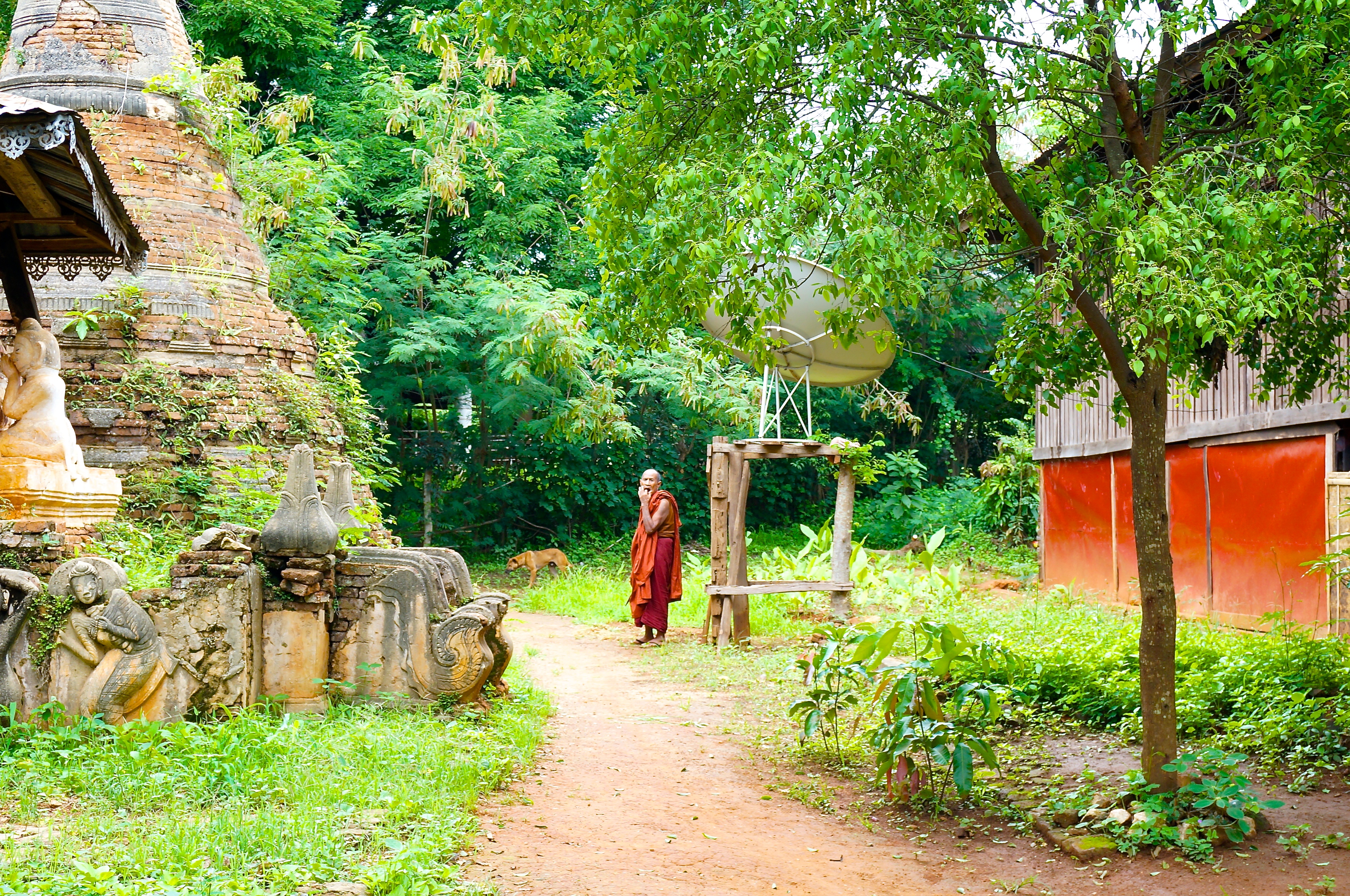
Image Credit: Lim Ashley
Iliberalisme dan Ilusi Demokrasi di Myanmar: Reformasi Konstitusi sebagai Modal Politik
Para aktor politik di Myanmar sedang berlaga dalam pertarungan mereformasi konstitusi yang menjelma sebagai modal politik. Semua aktor politik kunci Myanmar ingin menyetir arah reformasi konstitusional untuk kelak mengeruk untung atas modal politik yang terbuka lebar lewat peluang tersebut.
Di antara berbagai aktor yang tengah bergelut, militer adalah aktor politik terkuat dan paling tidak akuntabel. Sementara itu, Partai Persatuan Solidaritas dan Pembangunan (Union Solidarity and Development Party/USDP) berperan sebagai proksi militer ke arena politik. Partai-partai politik berbasis etnis pun turut punya peran sebagai beragam kelompok kecil yang terhubung erat dengan berbagai organisasi etnis bersenjata di seluruh pelosok negeri. Terakhir, tentu saja, Liga Nasional untuk Demokrasi (National League for Democracy/NLD), partai politik Aung San Suu Kyi. Masing-masing aktor politik tersebut hendak mengklaim bahwa merekalah yang mendorong reformasi konstitusi dengan harapan popularitas mereka akan melejit menjelang Pemilihan Umum 2020.
Persaingan Atas Reformasi Konstitusi
Pada Januari lalu, NLD menjadi penantang pertama dengan mengajukan mosi kepada parlemen nasional untuk membentuk sebuah komite yang bertugas meninjau dan mempertimbangkan amandemen terhadap konstitusi. Langkah NLD ini lantas memicu kontroversi sebab pengajuan mosi tersebut dilakukan pada peringatan dua tahun pembunuhan pengacara konstitusional terkemuka di Myanmar, yakni Ko Ni.
Militer menentang habis langkah NLD; para perwakilan mereka di parlemen menolak memberikan suara untuk mosi yang akan melandasi pembentukan komite terkait reformasi konstitusi. Mereka berargumen bahwa mosi tersebut prosedurnya tidak sah, padahal jelas mereka hanya tidak ingin NLD memimpin diskusi soal reformasi konstitusi ini.
Selain ditentang di parlemen, perlawanan muncul di jalanan. Demonstrasi meletus di Yangon dan negara bagian lain dengan tujuan menunjukkan dukungan kepada militer untuk mempertahankan inti sari Konstitusi.
Pada awal Februari, misalnya, ketika saya berada di Yangon, sekelompok demonstran pro-militer terlihat tengah bersiap-siap ketika taksi saya bergerak menuju pusat kota di hari Minggu sore. Para pendemo mengibarkan dua bendera. Satu adalah bendera nasional yang tak hanya menjadi simbol nasionalisme, tetapi juga simbol Konstitusi 2008 dan kekuatan di balik kelahiran konstitusi tersebut, yakni militer. Dengan mengibarkan bendera nasional, pendemo menggugah rasa kebanggaan nasionalis-militer di kalangan publik.
Bendera kedua bergambar merpati putih dengan latar belakang biru, yang menjadi pengingat atas proses perdamaian yang telah berlangsung sejak 2012. Proses perdamaian tersebut secara ekslusif ditujukan untuk kelompok-kelompok etnis bersenjata yang diakui. Secara terpisah namun paralel dengan proses perdamaian itu, sejumlah konflik berlangsung. Kekerasan di negara bagian Rakhine dan pengungsian massal orang-orang Rohingya dipandang pemerintah dan pihak militer sebagai isu terorisme. Sebagai konsekuensinya, masalah tersebut tidak ditangani dalam kerangka penyelesaian konflik dan proses menuju perdamaian. Kekuatan simbolik bendera sekadar dimanfaatkan untuk mendukung klaim bahwa konstitusi tidak bisa diganggu gugat.
Usulan untuk Perubahan: Baru Tapi Usang
USDP telah mengambil kesempatan mereformasi konstitusi di parlemen untuk mendorong agenda partai. Sebagai langkah awal, USDP menarget pasal 261, ketentuan dalam Konstitusi yang mengatur tentang penunjukan Kepala Menteri Negara Bagian dan Wilayah. Di Myanmar, ada empat belas negara bagian dan wilayah. Namun, kekuasaan pemerintah negara bagian dan wilayah itu terbatas dan mereka tetap menjaga hubungan erat dengan pemerintah pusat, pemerintah Republik Persatuan (Union government).
Hal ini karena Presiden memegang kekuasaan untuk menunjuk Kepala Menteri, yang lantas memangkas kemerdekaan pemerintah negara bagian dan wilayah, baik secara riil maupun dalam anggapan umum. Kekuasaan yang sama memastikan individu-individu terpilih memiliki hubungan erat dengan pemerintah pusat. USDP mengusulkan untuk mengubah konstitusi agar parlemen di tingkat negara bagian dan wilayah bisa menunjuk Kepala Menteri. Usulan USDP bukan barang baru, tetapi secara umum di Myanmar dipahami sebagai langkah menuju desentralisasi.
Demi mendapatkan kredit atas upaya mereformasi konstitusi, USDP ingin usulan mereka dipertimbangkan sebagai RUU terpisah. Bagi USDP, reformasi konstitusi adalah modal politik potensial menjelang pemilihan umum 2020. Sementara itu, NLD menolak proposal USDP dan justru menghendaki diskusi terkait proposal itu sebagai bagian dari peninjauan lebih luas atas reformasi konstitusi oleh komite legislatif yang dibentuk NLD. Perselisihan antara NLD dan USDP adalah cerminan pergulatan yang akan menentukan siapa yang dapat memperoleh dan mengklaim kredit atas reformasi konstitusi.
USDP dan militer turut mengajukan perubahan penting lain, di antaranya adalah langkah-langkah menuju desentralisasi. Sebagai contoh, presiden memiliki kewenangan penuh untuk menetapkan jumlah kementerian di tingkat negara bagian dan wilayah. USDP mengusulkan amademen konstitusi yang mengharuskan presiden berkonsultasi dengan parlemen negara bagian dan wilayah mengenai keputusan tersebut, dengan merevisi pasal 248 (c). Revisi tersebut akan menjadi langkah kecil namun signifikan dalam konteks densentralisasi, yang memungkinkan variasi dalam tata kelola di tiap-tiap negara bagian.
Baru-baru ini, pihak militer mengajukan usulan untuk memasukkan ketentuan baru dalam konstitusi dengan tujuan untuk mencegah Suu Kyi maju menjadi menteri di pemerintahan mendatang. Dalam pandangan pihak militer, individu yang memiliki kewarganegaraan asing atau kerabat berkewarganegaraan asing harus dilarang menjadi menteri dalam kabinet pusat. Ketentuan yang sama sudah ada terkait jabatan presiden, yang menjadi alasan mengapa Suu Kyi tidak bisa duduk di kursi kepresidenan.
Partai-partai politik kecil lainnya, seperti Partai Nasional Arakan (Arakan National Party/ANP), mendorong amandemen dalam rangka memastikan kursi legislatif hanya diduduki oleh perwakilan sipil. Proposal tersebut tak lain merupakan ajakan perang terbuka kepada militer sekaligus konsekuensi dari eskalasi konflik antara pasukan tentara PNA dan militer.
Di sisi lain, NLD berusaha mengambil jalan tengah, menyarankan agar jumlah perwakilan militer di parlemen dikurangi secara bertahap. Tak sulit melihat bahwa ada perpecahan besar mengenai keberadaan saat ini dan keberlanjutan perwakilan militer di jajaran legislatif di masa depan. Di kubu militer, upaya mempertahankan hak-hak istimewa mereka di bawah Konstitusi 2008, termasuk kursi di parlemen, tampak tak goyah.
Pada bulan Juli, komite untuk reformasi konstitusi telah merampungkan tinjauannya. Sebagian besar perdebatan, baik dalam proses maupun substansi, tak jauh berbeda dengan debat legislatif pada 2015. Sementara tuntutan baru atas reformasi konstitusi terus bermunculan, sebagian besar tuntutan tersebut tak lepas dari perdebatan lama yang berakar dari aspirasi akan pemerintahan sipil, federalisme, dan demokrasi di Myanmar.
Dukungan untuk Aung San Suu Kyi
Proses reformasi konstitusi belum mendapat perhatian internasional yang signifikan karena krisis kemanusiaan yang semakin genting. Situasi Muslim Rohingya, baik bagi mereka yang bertahan di Negara Bagian Rakhine maupun mereka yang melarikan diri ke Bangladesh, sungguh mengerikan. Kontras dengan pandangan di tingkat domestik, reputasi pemerintah Myanmar jelas tercemar di tingkat internasional.
Pada 19 September 2017, Aung San Suu Kyi berpidato di PBB dan memberikan pendapatnya sebagai Penasihat Negara Myanmar mengenai konflik serius dan krisis pengungsian di Negara Bagian Rakhine. Pidatonya dikritik secara luas oleh komunitas internasional karena gagal mengakui kenyataan dan krisis kemanusiaan yang gawat serta pengungsian besar-besaran Muslim Rohingya yang telah berlangsung sejak 25 Agustus.
Di dalam negeri sendiri, Suu Kyi diuntungkan dari krisis Negara Bagian Rakhine. Pada hari yang sama dengan pidato Suu Kyi di PBB, para pendukung Suu Kyi mengadakan aksi protes di kota-kota besar di Myanmar. Diaspora pro-Suu Kyi pun turut mengorganisir demonstrasi di berbagai titik di seluruh dunia, seperti di depan gedung parlemen Australia di Canberra. Dalam demonstrasi, slogan “We Stand with Daw Suu” bergaung dengan kencang.
Pesannya jelas: banyak orang di Myanmar mendukung Aung San Suu Kyi dan posisinya yang menyangkal krisis di Negara Bagian Rakhine. Hal ini menunjukkan dukungan terhadap pandangan iliberal yang menghukum dan mengucilkan penduduk Muslim Rohingya dari komunitas politik Myanmar.
Komunitas internasional telah dibuat bingung oleh respons kuat dan serempak dari kalangan dalam negeri Myanmar, yang sebagian besar menyangkal kondisi mengenaskan dan penderitaan kelompok Rohingya yang terpaksa mengungsi di Myanmar dan di seberang perbatasan di Bangladesh. Dalam berbagai kesempatan, pemerintah Liga Nasional untuk Demokrasi dan militer membantah skala, ruang lingkup, dan legitimasi penderitaan serta urgensi untuk mengambil tanggung jawab atas situasi Rohingya. Walaupun NLD bukannya tidak memiliki agensi sama sekali, kubu militer tetap di atas angin dalam ajang perebutan kuasa politik di Myanmar.
Perdebatan tentang reformasi konstitusi sering dipahami sebatas tentang hak-hak minoritas. Namun, watak debat yang cenderung illiberal justru menenggelamkan masalah Rohingya dalam diskusi. Hal ini terlepas dari sejumlah isu penting, mulai dari kewarganegaraan, pengakuan atas tanah, budaya, hingga hak-hak dasar, yang menjadi inti krisis Rohingya.
Permainan Sipil vs Milter: Kuasa Memberi Grasi
Debat reformasi konstitusi adalah arena di mana para aktor sipil berjuang melawan kekuatan militer. Pergulatan antara otoritas sipil dan militer bisa ditonton pula melalui adu kekuatan untuk mengampuni pelaku kekerasan di Negara Bagian Rakhine.
Dua jurnalis, Wa Lone dan Kyaw Soe Oo, mendekam di penjara selama lebih dari 16 bulan akibat tuduhan memperoleh rahasia negara. Kasus pemenjaraan jurnalis tersebut terkait erat dengan penyelidikan mereka mengenai pembantaian di salah satu desa di Negara Bagian Rakhine, yang kemudian sukses menjadi berita global setelah reportase mereka dikirim ke Reuters.
Di tengah kecaman masyarakat internasional, para jurnalis dijatuhi hukuman penjara, namun kemudian diampuni oleh presiden. Pada 7 Mei, kedua jurnalis tersebut dibebaskan atas keputusan presiden.
Presiden memiliki kewenangan untuk mengampuni atau memberikan amnesti berdasarkan rekomendasi dari Dewan Pertahanan dan Keamanan Nasional. Dewan ini terdiri dari sebelas anggota termasuk Panglima Tertinggi, dengan mayoritas anggota dari militer. Pemberian amnesti oleh presiden kepada para tahanan sudah menjadi tradisi Tahun Baru Myanmar.
Namun, dalam perkembangannya kemudian, beberapa pelaku pembantaian Inn Din juga diampuni melalui sebuah proses yang tampaknya rahasia dan diawasi ketat oleh militer. Beberapa perwira militer yang bertanggung jawab atas pembantaian Inn Din mula-mula dijatuhi hukuman sepuluh tahun penjara oleh Pengadilan Militer. Pengadilan Militer sendiri berada di bawah kendali Panglima Tertinggi. Keputusan itu diumumkan pada Maret 2018, tetapi pada November tahun yang sama para tentara itu diduga mendapat pengampunan secara rahasia. Publik baru mengetahui soal pemberian pengampunan tersebut enam bulan kemudian yakni pada Mei 2019. Seorang warga sipil yang juga dihukum karena terlibat dalam pembunuhan sepuluh warga desa Rohingya masih berada di penjara.
Keputusan untuk mengampuni tentara bisa jadi melanggar konstitusi. Militer mengklaim bahwa mereka memiliki kewenangan untuk mengampuni terdakwa yang diadili di Pengadilan Militer. Namun konstitusi tidak secara khusus memberi kuasa kepada Panglima Tertinggi untuk mengampuni atau memberikan amnesti kepada seseorang yang dihukum oleh Pengadilan Militer. Maka, pengampunan rahasia oleh militer bisa dilihat sebagai peragaan kekuasaan serta kemerdekaan militer.
Komunitas internasional tentu tidak diam melihat keputusan militer untuk membebaskan tentara-tentara tersebut. Pada Juli 2019, Amerika menjatuhkan sanksi kepada Panglima Tertinggi. Amerika menekankan sanksi tersebut sebagai wujud tanggapan atas tuduhan bahwa Panglima Tertinggi dan beberapa tokoh senior militer lainnya terkait pembunuhan di luar proses hukum atas warga Rohingya di Negara Bagian Rakhine.
Visi Illiberal tentang Reformasi
Suu Kyi dan NLD telah memenangkan dukungan di dalam negeri atas sikap mereka di Negara Bagian Rakhine, tetapi secara bersamaan kehilangan dukungan dari komunitas internasional. Mereka masih menghadapi perlawanan dalam negeri, terutama dari kelompok-kelompok pro-militer, yang dibuktikan secara jelas dalam gelombang protes perubahan anti-konstitusi.
Krisis Negara Bagian Rakhine telah diisolasi dari proses perdamaian dan perdebatan tentang reformasi konstitusi.
Konstitusi justru membantu mempertahankan ilusi tentang kekuatan sipil dan demokrasi di Myanmar. Contoh kekuasaan untuk memberikan pengampunan yang dibahas di atas menunjukkan bahwa kekuasaan konstitusional presiden bisa dirusak oleh kekuatan militer dengan mengampuni diam-diam tentara yang dihukum karena melakukan tindak kejahatan mengerikan di Negara Bagian Rakhine. Ini hanyalah salah satu contoh bagaimana permainan kekuasaan militer mengalahkan otoritas sipil di Myanmar.
Semua aktor politik tahu bahwa rakyat menginginkan suatu perubahan dalam konstitusi. Semua ingin mengambil kredit untuk menciptakan perubahan tersebut. Oleh karena itu, reformasi konstitusi bisa dianggap semacam modal politik di Myanmar. Namun perjuangan untuk memenangkan modal politik melalui reformasi konstitusi bukanlah antara visi liberal dan iliberal terkait demokrasi, melainkan antara visi yang berbeda-beda tentang kekuasaan iliberal, sebagaimana diperlihatkan oleh perdebatan tentang reformasi konstitusi. Persamaan yang dimiliki oleh semua aktor politik Myanmar adalah komitmen terhadap politik iliberal yang mengucilkan Muslim Rohingya.
Translated into Indonesian by Levriana Yustriani
 Facebook
Facebook  Twitter
Twitter  Soundcloud
Soundcloud  Youtube
Youtube  Rss
Rss 